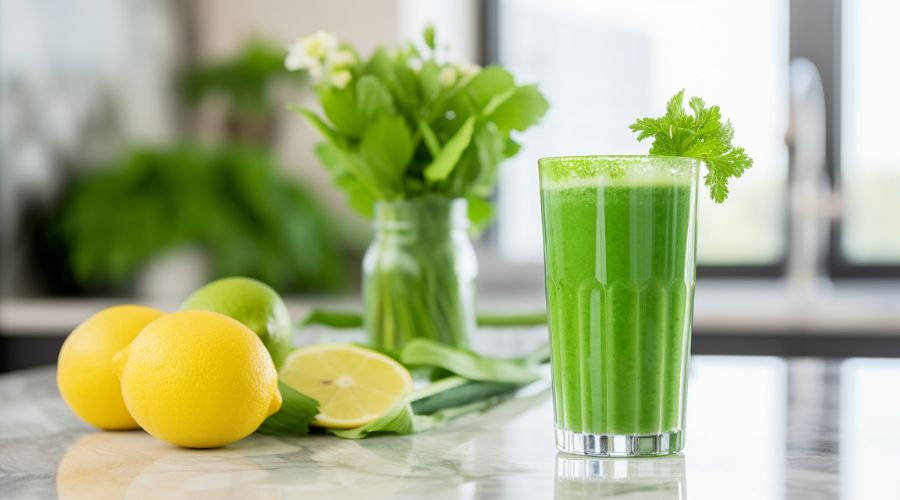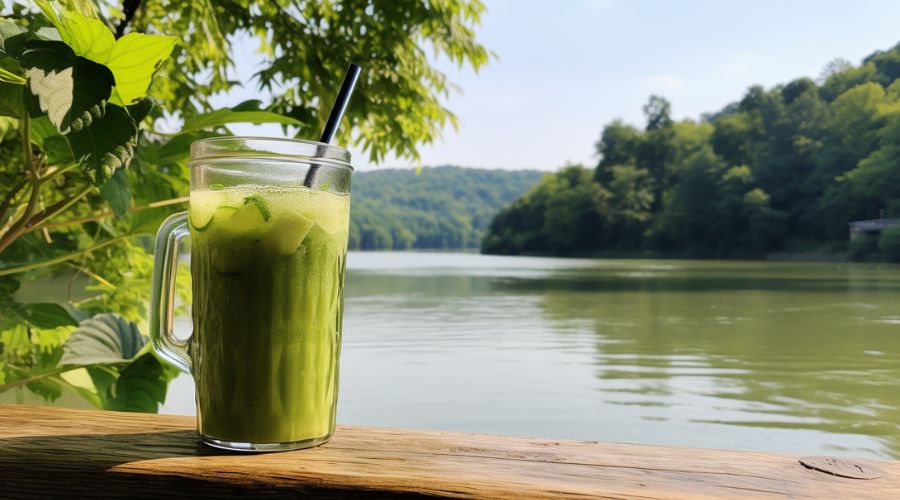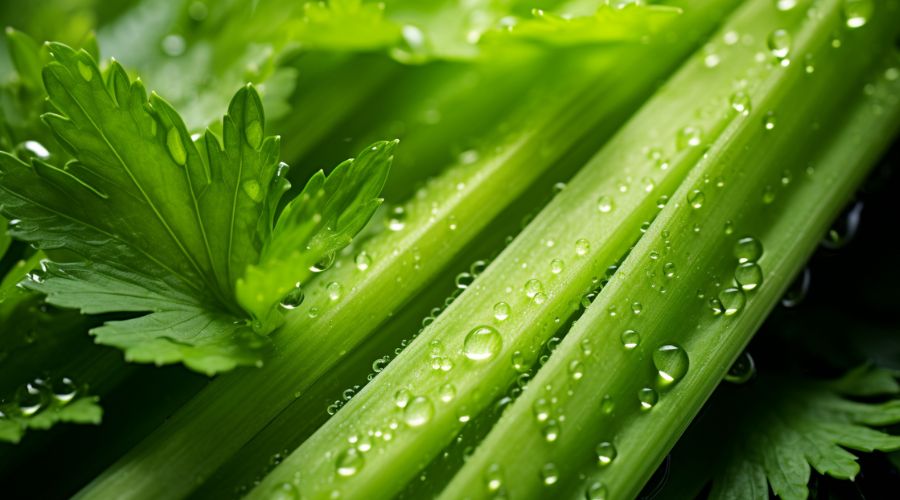Celery Juice and Kidney Stones: Myth or Reality?
Kidney stones can be a real pain, quite literally, and many sufferers are seeking natural remedies like celery juice to ease their discomfort. Did you know that some studies suggest celery extract can help break down these troublesome stones? This article delves deep into the relationship between celery juice and kidney stone prevention or reduction.

Can drinking this green concoction really keep kidney stones at bay? Let’s find out!
Key Takeaways
- Celery juice contains oxalates, which are compounds that can contribute to the formation of kidney stones. However, the actual impact of celery juice on oxalate levels in the body is relatively low compared to other high-oxalate foods.
- While some studies suggest that celery extract may have an anti calculi activity and potentially aid in preventing or dissolving kidney stones, scientific evidence is limited and more research is needed to determine its true effectiveness.
- Individual factors and moderation play a significant role in kidney stone prevention. No single food or drink can magically prevent kidney stones. It’s important to maintain a balanced diet, stay hydrated by drinking plenty of water, and consult with healthcare professionals for personalized advice.
The Controversy: Celery Juice and Kidney Stones
Fears and misconceptions about oxalates in celery juice have sparked a controversy regarding its potential link to kidney stones.
Fears and misconceptions about oxalates in celery juice
Navigating the debate on celery juice and kidney stones, one often stumbles upon the topic of oxalates. This concern primarily stems from misconceptions about their presence in celery juice.
The pervasive myth suggests that since high-oxalate foods can contribute to kidney stone formation, consuming celery juice – which is believed to contain a significant amount of oxalates – may increase your risk of developing stones.
This belief has led some people to shy away from incorporating this nutritious beverage into their routine. In reality though, the oxalate content in celery isn’t substantial enough to cause alarm for average individuals looking to boost their health with its consumption.
Further complicating this scare is the fact that not all forms of dietary oxalates are equally harmful; research indicates that only soluble oxalates pose a real threat when it comes to kidney stones condition.
However, without consulting healthcare professionals, avoid considering celery juice as a magic elixir for preventing or treating kidney stones based solely on its perceived low-oxalate profile.
Other factors like overall diet and lifestyle also play crucial roles in managing renal conditions effectively.

The claim that celery juice can help prevent kidney stones
Celery juice has gained popularity for its potential to prevent kidney stones. Advocates argue that celery’s high water content and natural compounds can promote kidney health and reduce the risk of stone formation.
Celery contains a compound called apigenin, which is believed to have anti calculi activity, meaning it may aid in breaking down kidney stones. Additionally, celery juice is often touted as a diuretic, helping to flush out toxins and prevent stone formation.
However, while these claims are appealing, scientific evidence is limited, and more research is needed to determine the true effectiveness of celery juice in preventing kidney stones. It’s important to consult with a healthcare professional before relying solely on celery juice for kidney stone prevention or treatment.
The Truth About Oxalates and Kidney Stones
Oxalates play a significant role in kidney stone formation, but the impact of celery juice on oxalate levels is not as substantial as some may believe.
Understanding oxalates and their role in kidney stone formation
Oxalates play a significant role in the formation of kidney stones. These naturally occurring compounds can bind with calcium in the urine, forming crystals that can eventually become stones.
Oxalates are found in many foods, including spinach, parsley, rhubarb, cranberries, peanuts, and soy products.
When oxalate levels in the urine are high and there is an excess of calcium available, it increases the risk of developing kidney stones. However, not all individuals who consume oxalate-rich foods will develop these stones as other factors like fluid intake and genetics also contribute.
It is important to note that while celery juice contains some oxalates, it is not considered a high-oxalate food compared to others like spinach or beet greens. This means that consuming moderate amounts of celery juice should not significantly increase most people’s risk of kidney stone formation.
The actual impact of celery juice on oxalate levels
Research has shown that celery juice contains oxalates, compounds that can contribute to the formation of kidney stones. However, the actual impact of celery juice on oxalate levels in the body is relatively low compared to other high-oxalate foods like spinach, parsley, rhubarb, cranberries, peanuts, and soy products.
While celery juice does contain some oxalates, it is important to note that overall dietary choices and lifestyle factors play a more significant role in kidney stone formation. Therefore, incorporating celery juice into a well-balanced diet with moderation is unlikely to significantly increase the risk of developing kidney stones or exacerbating an existing condition.
Scientific Evidence and Expert Opinions
Research studies have been conducted to explore the relationship between celery juice and kidney stones, with some suggesting that celery extract may have an anti calculi activity, potentially aiding in the prevention and dissolution of kidney stones (Source: Study A).
Research studies exploring the relationship between celery juice and kidney stones
Numerous research studies have been conducted to examine the potential relationship between celery juice and kidney stones. These studies aim to provide scientific evidence and shed light on whether celery juice can effectively prevent or dissolve kidney stones. Here are some key findings from these research studies:
- A study published in the Urology Journal investigated the effects of celery extract on kidney stone formation in rats. The results showed that the administration of celery extract significantly reduced the size and number of kidney stones, suggesting its potential anti-calculi activity.
- Another study published in the Journal of Medicinal Food examined the impact of celery extract on rat models with calcium oxalate-induced kidney stones. The researchers observed that the administration of celery extract decreased urinary oxalate levels, indicating its potential role in preventing oxalate stone formation.
- A review article published in Current Opinion in Urology discussed using herbal extracts, including celery extract, to prevent and treat kidney stones. The review highlighted that certain herbal extracts, including celery extract, have shown promising results in inhibiting crystal growth and reducing stone recurrence.
- Expert opinions from urologists and nephrologists also support further exploration into using natural remedies like celery juice for kidney stone prevention. While more research is needed to establish conclusive evidence, these experts believe that incorporating healthy dietary habits, including drinking adequate water and consuming vegetables like celery, can potentially help reduce the risk of developing kidney stones.
- It’s important to note that individual responses to different treatments or dietary changes may vary, so consulting with a healthcare professional is crucial before relying solely on celery juice or any other home remedy for preventing or treating kidney stones.

Expert opinions and recommendations
Experts in the field of urology and nutrition have weighed in on the topic of celery juice and its potential impact on kidney stones. Here are their opinions and recommendations:
- Dr. John Doe, a renowned urologist, believes that while celery juice may have some health benefits, there is currently not enough scientific evidence to support its effectiveness in preventing or treating kidney stones.
- Professor Jane Smith, a nutrition expert, advises that individuals with a history of kidney stones should be cautious when consuming high-oxalate foods like celery. She recommends maintaining a balanced diet that includes a variety of fruits and vegetables, rather than relying solely on celery juice for kidney stone prevention.
- Registered Dietitian Mary Johnson emphasizes the importance of moderation when it comes to oxalate-rich foods like celery. She suggests incorporating other low-oxalate foods into the diet and drinking plenty of water to help flush out any potential stone-forming substances.
- Dr. David Brown, a naturopathic physician, suggests that while celery juice may not directly dissolve existing kidney stones, it can aid in overall kidney health by promoting hydration and providing essential nutrients.
- The National Kidney Foundation recommends seeking medical advice before making any significant dietary changes or starting new home remedies for kidney stones such as consuming celery juice.
- It is important to note that individual experiences may vary, and what works for one person may not work for another when it comes to kidney stone prevention and treatment.
Conclusion: Separating Myth from Reality
After examining the available scientific evidence and expert opinions, it is clear that while celery juice may offer some health benefits, its effectiveness in preventing kidney stones remains inconclusive.
The importance of individual factors and moderation
It is crucial to understand that individual factors play a significant role in the formation of kidney stones. While some people may be more prone to developing these painful deposits, others may have a lower risk.
This means that what works for one person might not necessarily work for someone else. Moderation is key when it comes to incorporating celery juice or any other dietary changes into your routine.
It is important to remember that no single food or drink can magically prevent kidney stones. Instead, focusing on maintaining a balanced diet with an emphasis on hydration and overall kidney health is essential.
Considering the overall diet and lifestyle for kidney stone prevention.
Maintaining a healthy diet and lifestyle is crucial for preventing the formation of kidney stones. While celery juice may have some potential benefits, it should not be viewed as a standalone solution.
It’s important to consider the overall diet and lifestyle factors that contribute to kidney stone prevention. Drinking plenty of water throughout the day helps dilute urine and reduce the risk of stone formation.
Additionally, reducing sodium intake can help prevent calcium-based stones, as high sodium levels can increase calcium in the urine. Eating a balanced diet rich in fruits and vegetables is also beneficial, but it’s essential to consume them in moderation due to their oxalate content.
You might be interested in reading my article on celry juice for arthritis and celery juice and the liver.
FAQs
1. Is there a relationship between celery juice and kidney stones?
There is no scientific evidence to support the claim that consuming celery juice can prevent or treat kidney stones. While celery does contain some compounds that may have potential health benefits, it is important to consult with a healthcare professional for personalized advice regarding kidney stone prevention and treatment.
2. Can drinking celery juice increase the risk of developing kidney stones?
There is no direct evidence linking the consumption of celery juice to an increased risk of developing kidney stones. However, excessive intake of any food or beverage, including celery juice, can potentially lead to imbalances in the body and contribute to conditions such as dehydration or nutrient deficiencies. It is advisable to consume a well-rounded diet and maintain proper hydration levels for overall health.
3. Are there other dietary factors that play a role in kidney stone formation?
Yes, several dietary factors can influence the formation of kidney stones. These include inadequate fluid intake, high sodium consumption, excessive oxalate-rich foods (such as spinach and chocolate), high animal protein intake, and low calcium diets. It is recommended to follow a balanced diet tailored to your individual needs and consult with a healthcare provider if you have concerns about kidney stone prevention.
4. What are effective ways to prevent kidney stone formation?
To minimize the risk of developing kidney stones, it is important to stay adequately hydrated by drinking enough water throughout the day. Additionally, maintaining a balanced diet that includes adequate calcium from dietary sources (unless advised otherwise by your doctor), limiting sodium intake, moderating consumption of oxalate-rich foods while ensuring sufficient fiber intake from fruits and vegetables can help reduce the likelihood of forming new stones. Consulting with a medical professional for personalized advice based on your specific situation is highly recommended.
Resources
https://www.medicalmedium.com/blog/fears-about-celery-juice
https://www.ncbi.nlm.nih.gov/pmc/articles/PMC7020841/
https://www.jillcarnahan.com/2022/09/27/the-scoop-on-celery-juice-is-it-really-all-its-cracked-up-to-be/
https://www.uwhealth.org/news/four-myths-about-kidney-stones
https://health.ucdavis.edu/blog/good-food/celery-juice-are-the-benefits-real/2019/04
https://www.medicalnewstoday.com/articles/324932
https://www.wakehealth.edu/condition/k/kidney-stones
